-
ORIGINAL ARTICLE10-09-2023
Intestinal parasitic infections: telephone health literacy with men in areas of poverty in the syndemic
Revista Brasileira de Enfermagem. 2023;76(4):e20220300
Abstract
ORIGINAL ARTICLEIntestinal parasitic infections: telephone health literacy with men in areas of poverty in the syndemic
Revista Brasileira de Enfermagem. 2023;76(4):e20220300
DOI 10.1590/0034-7167-2022-0300
Views0See moreABSTRACT
Objectives:
to assess Popular Health Education practices on intestinal parasites, carried out by telephone contact with men living in urban communities in Rio de Janeiro, Brazil, during the COVID-19 syndemic.
Method:
a quasi-experimental, quantitative and descriptive study, carried out with men aged 20 to 59 years. Pre-test was applied, and participants were divided into two groups: control and experimental. Popular Education in Health practices were carried out with an experimental group, and post-test was applied for both.
Results:
health education practices were significant in the experimental group, with a reduction in incorrect answers. There was an increase in incorrect answers in the control group’s post-test.
Conclusions:
the Brazilian National Policy for Popular Education in Health contributed to qualify men’s health literacy on intestinal parasites. Practice by telephone contact proved to be a powerful strategy for nursing and public policies to access this group and promote health in Primary Health Care.

-
Content validation of an instrument for medical record audits
Revista Brasileira de Enfermagem. 2023;76(4):e20220109
Abstract
Content validation of an instrument for medical record audits
Revista Brasileira de Enfermagem. 2023;76(4):e20220109
DOI 10.1590/0034-7167-2022-0109
Views0See moreABSTRACT
Objective:
To build and validate the content of an instrument to conduct medical record audits; to conduct a pre-test.
Methods:
Methodological study conducted from May/2020 to May/2021 in three stages: 1) development of the instrument by bibliographic survey and benchmarking; 2) content validation using the Delphi technique; 3) application of the instrument and descriptive analysis in a sample of 200 medical records.
Results:
An instrument was constructed with 11 domains containing sub-items that characterize the quality of care. Two stages of the Delphi technique were necessary to reach a content validity index higher than 0.90. For each domain, a graduated scale with a numerical value from 1 to 4 points was attributed, reflecting the quality of its completion. The average time of application was 35 minutes per record.
Conclusions:
The tool proved to be viable to support clinical audits to identify the level of excellence and reveal opportunities for improvement in care processes.
-
ORIGINAL ARTICLE10-09-2023
Factors associated with older adults’ knowledge, attitude and practice on skin cancer prevention
Revista Brasileira de Enfermagem. 2023;76(3):e20220606
Abstract
ORIGINAL ARTICLEFactors associated with older adults’ knowledge, attitude and practice on skin cancer prevention
Revista Brasileira de Enfermagem. 2023;76(3):e20220606
DOI 10.1590/0034-7167-2022-0606
Views0See moreABSTRACT
Objectives:
to identify factors associated with older adults’ knowledge, attitude and practice regarding skin cancer prevention.
Methods:
this is a cross-sectional study, carried out with 120 older adults from a Basic Health Unit in Quixadá, Ceará, from September to November 2018.
Results:
individuals aged 60 to 69 years and working were statistically associated with adequate knowledge (p=0.038). Having light skin, eyes and hair was associated with adequate attitude (p=0.030). Having skin problems, such as bleeding wounds, was associated with adequate practice (p=0.016). With regard to inappropriate behavior for skin cancer prevention, there was a statistically significant association between working or having worked under direct exposure to the sun, inadequate knowledge (p=0.036), inadequate attitude (p=0.010) and having incomplete primary education and inadequate practice (p<0.001).
Conclusions:
sociodemographic and clinical factors influence older adults’ knowledge, attitude and practice regarding skin cancer prevention.
-
ORIGINAL ARTICLE10-09-2023
Epidemiology of monkeypox notifications in the state of Minas Gerais, Brazil
Revista Brasileira de Enfermagem. 2023;76(3):e20220598
Abstract
ORIGINAL ARTICLEEpidemiology of monkeypox notifications in the state of Minas Gerais, Brazil
Revista Brasileira de Enfermagem. 2023;76(3):e20220598
DOI 10.1590/0034-7167-2022-0598
Views0See moreABSTRACT
Objectives:
to describe the epidemiological profile of suspected, confirmed, and probable cases of monkeypox in the state of Minas Gerais, Brazil.
Methods:
a descriptive, retrospective study of reported suspected, confirmed, and probable cases of monkeypox infection in the state of Minas Gerais, Brazil. The study period was from the first notification, on June 11, to September 7, 2022.
Results:
a total of 759 suspected, confirmed, and probable cases of monkeypox infection were reported, with 35.44% suspected, 53.75% confirmed, and 10.81% probable cases, respectively. As for the coexisting diseases within confirmed cases, 38.79% were related to people living with human immunodeficiency virus, and 13.74% had some active sexually transmitted infection. Regarding the evolution of confirmed cases, 47.43% were cured.
Conclusions:
the results contribute to greater knowledge and control of the infection by allowing better disease management and care offered in health services.
-
ORIGINAL ARTICLE10-09-2023
Elaboration of an educational video for cardiopulmonary resuscitation with chest compressions in adults
Revista Brasileira de Enfermagem. 2023;76(3):e20220367
Abstract
ORIGINAL ARTICLEElaboration of an educational video for cardiopulmonary resuscitation with chest compressions in adults
Revista Brasileira de Enfermagem. 2023;76(3):e20220367
DOI 10.1590/0034-7167-2022-0367
Views0ABSTRACT
Objectives:
to develop and analyze the face and content validity of a storyboard for constructing an educational video for training laypersons in cardiopulmonary resuscitation with only chest compressions in adults.
Methods:
a methodological study of storyboard elaboration and validity for producing an educational health video. The storyboard was submitted to analysis of 20 judges to assess its adequacy with the proposed objective. To assess the agreement between judges, the Content Validity Index was calculated. After validating the storyboard, video production took place.
Results:
the Content Validity Index met expectations. Its mean in each group was ≥ 0.90 (lay judges = 0.97; expert judges = 0.90; all judges = 0.94).
Conclusions:
the video produced is composed of scientific information, professional expertise and laypersons’ perceptions, making it important evidence for health education.
Keywords:Cardiopulmonary ResuscitationInstructional Film and VideoOut-of-Hospital Cardiac ArrestPublic Health NursingValidity StudySee more
-
ORIGINAL ARTICLE10-09-2023
Palliative care in nursing training: higher education course coordinators’ perception
Revista Brasileira de Enfermagem. 2023;76(3):e20220222
Abstract
ORIGINAL ARTICLEPalliative care in nursing training: higher education course coordinators’ perception
Revista Brasileira de Enfermagem. 2023;76(3):e20220222
DOI 10.1590/0034-7167-2022-0222
Views0See moreABSTRACT
Objectives:
to analyze undergraduate nursing course coordinators’ perception about nursing training in palliative care.
Methods:
a descriptive study, with a qualitative approach and thematic content analysis, carried out with coordinators of nursing courses in Higher Education Institutions in Rio Grande do Norte.
Results:
three thematic categories emerged: Nursing training in palliative care; Potentialities for teaching palliative care; and Challenges of teaching in palliative care. The coordinators described as potentialities: transversality, theoretical and practical approach, optional subject, university extensions, interdisciplinarity and transdisciplinary approach, and as challenges: biomedical model in health education and insufficient professor training.
Final Considerations:
palliative care teaching in the researched institutions in the nursing education process is approached in an incipient and fragmented way, and almost always without having a specific curricular component on the subject, being present as one of its contents.
-
ORIGINAL ARTICLE10-06-2023
Ethical problems in nursing teleconsultations for people living with HIV during the Covid-19 pandemic
Revista Brasileira de Enfermagem. 2023;76:e20220754
Abstract
ORIGINAL ARTICLEEthical problems in nursing teleconsultations for people living with HIV during the Covid-19 pandemic
Revista Brasileira de Enfermagem. 2023;76:e20220754
DOI 10.1590/0034-7167-2022-0754
Views0See moreABSTRACT
Objectives:
to understand the ethical problems experienced by primary health care nurses in using nursing teleconsultations for people living with the human immunodeficiency virus during the coronavirus pandemic.
Methods:
qualitative research, anchored in Constructivist Grounded Theory. Data was collected between July and September 2020, with 17 participants.
Results:
the first category highlights the ethical problems in conducting teleconsultations, managing high demand, communication barriers, and risks related to data security. The second emphasizes the potential of teleconsultations in communication and access, by generating changes in the work process and the use of protocols to guide clinical practice.
Conclusions:
nurses’ work in digital mode requires professional qualification, with a view to stimulating reflection on teleconsultation practice, ethical-moral deliberation and combating stigma, and also adopting data security-centered conduct.
-
Ethical dilemmas and illicit acts in nursing: reflections on the legal (dis)order
Revista Brasileira de Enfermagem. 2023;76:e20220558
Abstract
Ethical dilemmas and illicit acts in nursing: reflections on the legal (dis)order
Revista Brasileira de Enfermagem. 2023;76:e20220558
DOI 10.1590/0034-7167-2022-0558
Views0See moreABSTRACT
Objectives:
to reflect on aspects of the legal system that involve situations of ethical dilemmas and illegal acts applied in legal proceedings related to nursing professionals.
Methods:
theoretical-reflective essay anchored in conceptions issued by a Brazilian nursing class body, based on technical opinions, in articulation with examples extracted from judges of the Superior Court of Justice.
Results:
the legal sources demonstrated the need to support nursing practices through a due and clear understanding of the notions addressed. Indeed, ethical dilemmas linked to professional practice usually refer to the psychological impact of having to act differently from what feels morally, ethically, or professionally appropriate.
Final Considerations:
the reflection was guided by conceptual and legal issues involving nursing practice, pointing to the need to monitor the effects of legal disorder caused by current legislation, which may have implications for the legal security of professionals.
-
ORIGINAL ARTICLE07-29-2024
Evidence of validity of the Risk Self-Medication Questionnaire focused on Health Literacy
Revista Brasileira de Enfermagem. 2024;77(3):e20230386
Abstract
ORIGINAL ARTICLEEvidence of validity of the Risk Self-Medication Questionnaire focused on Health Literacy
Revista Brasileira de Enfermagem. 2024;77(3):e20230386
DOI 10.1590/0034-7167-2023-0386
Views0See moreABSTRACT
Objectives:
to analyze the validity evidence of the internal structure of the Risk Self-Medication Questionnaire Focused on Health Literacy.
Methods:
a psychometric study with 499 adults. The internal structure was assessed with exploratory and confirmatory factor analysis to prove the adjustment. Internal consistency was measured by composite reliability and McDonald’s omega coefficient (ω).
Results:
the parameters revealed a model of 35 items distributed across four factors, explaining 56% of the total variance, with factor loadings ranging from 0.31 to 0.85 and adequate communalities. Accuracy (0.79
Conclusions:
an instrument was obtained with good evidence of structural validity for measuring self-medication.
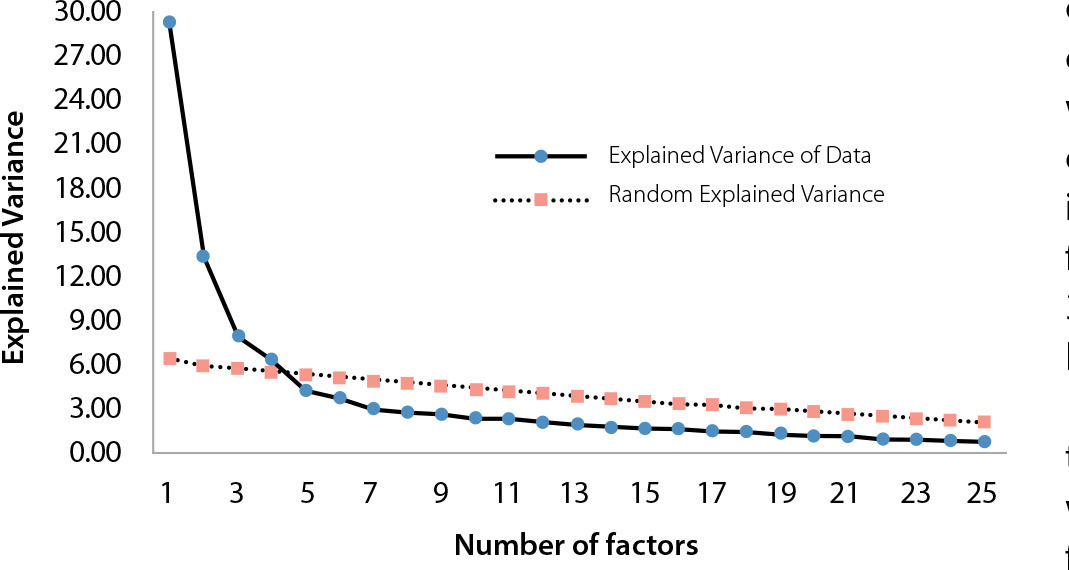
-
ORIGINAL ARTICLE07-29-2024
Nurses’ perspectives on nurses’ work methods
Revista Brasileira de Enfermagem. 2024;77(3):e20230374
Abstract
ORIGINAL ARTICLENurses’ perspectives on nurses’ work methods
Revista Brasileira de Enfermagem. 2024;77(3):e20230374
DOI 10.1590/0034-7167-2023-0374
Views0See moreABSTRACT
Objectives:
To analyze nurses’ perspectives on nurses’ work methods in the hospital context.
Methods:
A descriptive study with a qualitative approach was conducted in a hospital in northern Portugal, involving 17 nurses. Semi-structured interviews were used for data collection. Data collected between May and June 2023 underwent content analysis, supported by Atlas.ti software.
Results:
Three thematic areas emerged: “Nurses’ work methods in a hospital context,” highlighting the conception and components of work methods and the methods in use; “Implementation of nurses’ work methods,” emphasizing influencing factors and challenges to implementation; and “Impact of nurses’ work methods on patients, nurses, and institutions.”
Final Considerations:
Nurses’ work methods constitute the structure of nursing care. Some factors influence and some challenges arise in the implementation of these methods, producing impacts on patients, nurses, and institutions.

-
ORIGINAL ARTICLE07-29-2024
Nursing Process for institutionalized older adults: contributions from knowledge awareness workshop
Revista Brasileira de Enfermagem. 2024;77(3):e20230349
Abstract
ORIGINAL ARTICLENursing Process for institutionalized older adults: contributions from knowledge awareness workshop
Revista Brasileira de Enfermagem. 2024;77(3):e20230349
DOI 10.1590/0034-7167-2023-0349
Views0See moreABSTRACT
Objective:
To analyze the knowledge of professionals working in a Nursing Home about the Nursing Process before and after the awareness workshop.
Methods:
This is strategic action research, developed with nursing professionals and managers of a Nursing Home in Rio Grande do Sul, Brazil. Data were collected between January and June 2023, through semi-structured interviews before and after an awareness workshop. Discursive textual analysis of the data was carried out.
Results:
The central category “Understanding about the Nursing Process in Nursing Homes” emerged, which was unitized into two units of meaning and three categories of analysis.
Conclusion:
Data revealed non-use and lack of knowledge of the Nursing Process before awareness raising. Afterwards, a deeper understanding of the topic and its importance was identified. Awareness-raising workshops contribute to transformation of knowledge.
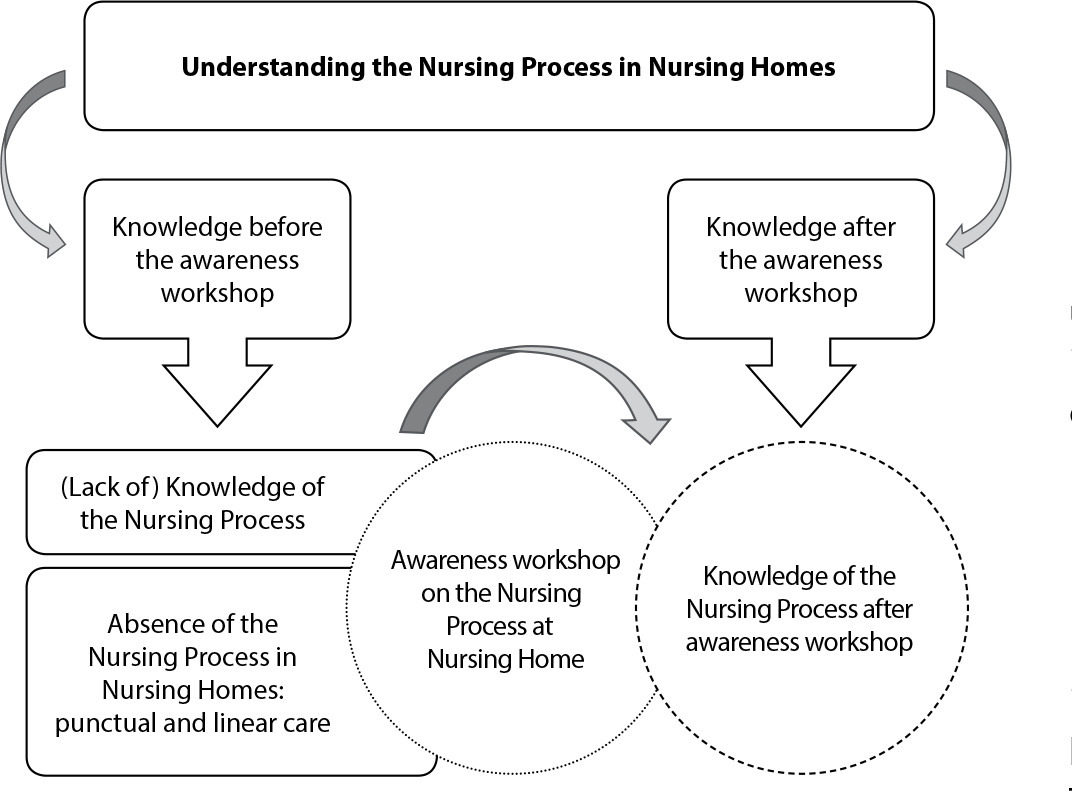
-
ORIGINAL ARTICLE07-29-2024
Excessive daytime sleepiness in nursing technicians: association with sleep quality and memory
Revista Brasileira de Enfermagem. 2024;77(3):e20230332
Abstract
ORIGINAL ARTICLEExcessive daytime sleepiness in nursing technicians: association with sleep quality and memory
Revista Brasileira de Enfermagem. 2024;77(3):e20230332
DOI 10.1590/0034-7167-2023-0332
Views0See moreABSTRACT
Objective:
to investigate excessive daytime sleepiness prevalence among nursing technicians and the association with sleep quality and memory.
Methods:
a cross-sectional, inferential study, carried out in a hospital unit in the state of Goiás between December 2020 and January 2021. Assessments were carried out using the Epworth Sleepiness Scale, the Pittsburgh Sleep Quality Index and the Prospective and Retrospective Memory Questionnaire, instruments validated for the Brazilian context. Bivariate and multivariate logistic regression analyzes were performed.
Results:
the sample consisted of 189 nursing technicians with a 40.9% excessive daytime sleepiness prevalence. In multivariate models, excessive daytime sleepiness was not associated with sleep quality, however there was a significant association with overall memory failures.
Conclusions:
study results demonstrate a high excessive daytime sleepiness occurrence, an association with overall memory failures and the need for psychosocial interventions for nursing technicians.
-
ORIGINAL ARTICLE07-29-2024
Educational technology for multidisciplinary training for managing waiting lists for elective patients
Revista Brasileira de Enfermagem. 2024;77(3):e20230299
Abstract
ORIGINAL ARTICLEEducational technology for multidisciplinary training for managing waiting lists for elective patients
Revista Brasileira de Enfermagem. 2024;77(3):e20230299
DOI 10.1590/0034-7167-2023-0299
Views1See moreABSTRACT
Objectives:
to construct and assess an educational technology for managing patient waiting lists for multidisciplinary training.
Methods:
study supported by Instructional Design – ADDIE model, whose stages of construction of educational technology were developed in the form of a multi-professional training course. Its respective content assessment was carried out by a committee of experts from 2021 to 2022. The analysis occurred based on the proportion of content adequacy with 95% Confidence Interval.
Results:
seventeen products were created as educational technology learning objects: five storyboards; four videos; three comic books; two pedagogical action plans; a mind map; and a YouTube® playlist. Nine experts assessed content adequacy, which reached 0.89.
Conclusions:
this educational technology contributes to the performance of professionals who manage waiting lists by reducing inequalities, alleviating differences, in addition to promoting equity in care and good health for patients in the Brazilian Health System.

-
ORIGINAL ARTICLE07-29-2024
Fuzzy Logic: vulnerability of women who have sex with women to sexually transmitted infections
Revista Brasileira de Enfermagem. 2024;77(3):e20230271
Abstract
ORIGINAL ARTICLEFuzzy Logic: vulnerability of women who have sex with women to sexually transmitted infections
Revista Brasileira de Enfermagem. 2024;77(3):e20230271
DOI 10.1590/0034-7167-2023-0271
Views0ABSTRACT
Objective:
To describe the possibility of applying Fuzzy Logic in analyzing the vulnerability of Women Who Have Sex with Women to Sexually Transmitted Infections/HIV/AIDS.
Methods:
We developed a Fuzzy Logic system with 17 input variables and one output variable, using data related to vulnerability in a municipality located in the Midwest region of the State of São Paulo, Brazil.
Results:
The factor with the greatest positive impact was the confirmation that a low understanding of Sexually Transmitted Infections/HIV/AIDS is associated with higher vulnerability. Conversely, the statement “Not disclosing sexual activity to healthcare professionals,” where individuals do not admit to having sex with women, had the least impact.
Conclusions:
Fuzzy Logic facilitates the identification of vulnerability, expressed through the analysis of interaction between variables in each dimension. This makes it a promising method to assist in analyzing the vulnerability of specific populations.
Keywords:Fuzzy LogicHealth VulnerabilityReproductive HealthSexually Transmitted DiseasesWomen Who Have Sex With WomenSee more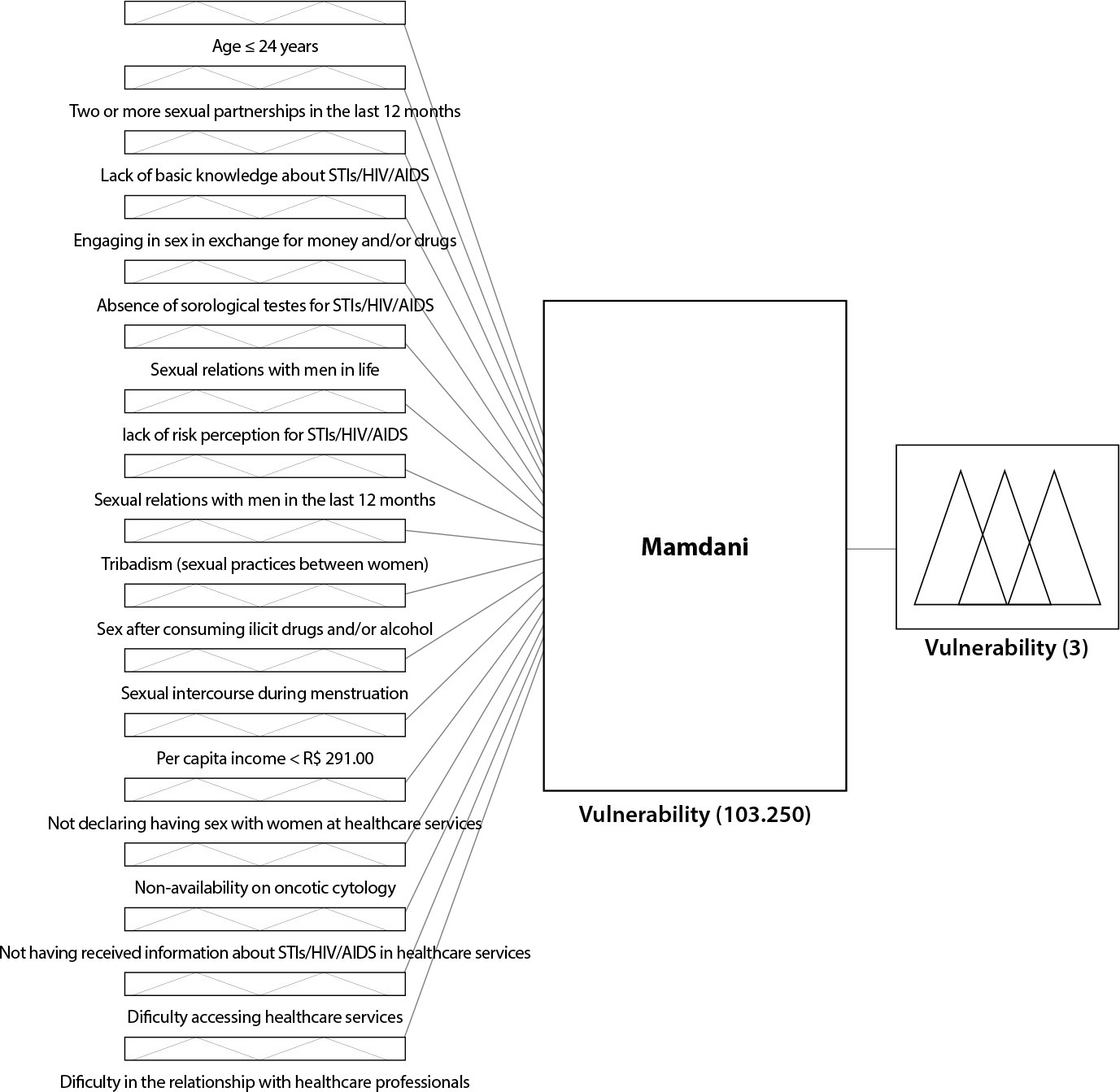
-
ORIGINAL ARTICLE07-29-2024
University Student Depression Inventory, Brazilian Version, Construct Assessment
Revista Brasileira de Enfermagem. 2024;77(3):e20230232
Abstract
ORIGINAL ARTICLEUniversity Student Depression Inventory, Brazilian Version, Construct Assessment
Revista Brasileira de Enfermagem. 2024;77(3):e20230232
DOI 10.1590/0034-7167-2023-0232
Views0See moreABSTRACT
Objectives:
to assess the University Student Depression Inventory, Brazilian version (USDI-BR), construct.
Methods:
a methodological study carried out with a snowball probabilistic sample, consisting of 334 undergraduate and graduate students. Confirmatory factor analysis, reliability using McDonald’s omega coefficient and Cronbach’s alpha were performed. Principal component analysis was performed using the varimax rotation and oblimin rotation, using the Kaiser-Meyer-Olkin criteria, Bartlett’s test of sphericity and scree plot.
Results:
the USDI-BR presented an internal consistency of items of ω = 0.95 and remained with 30 items, with the addition of 1 factor (Death wish and social withdrawal), totaling 4 factors.
Conclusions:
the USDI-BR has evidence that points to its validity and also its internal consistency, deserving that new studies be carried out to expand the evidence of its psychometric properties.
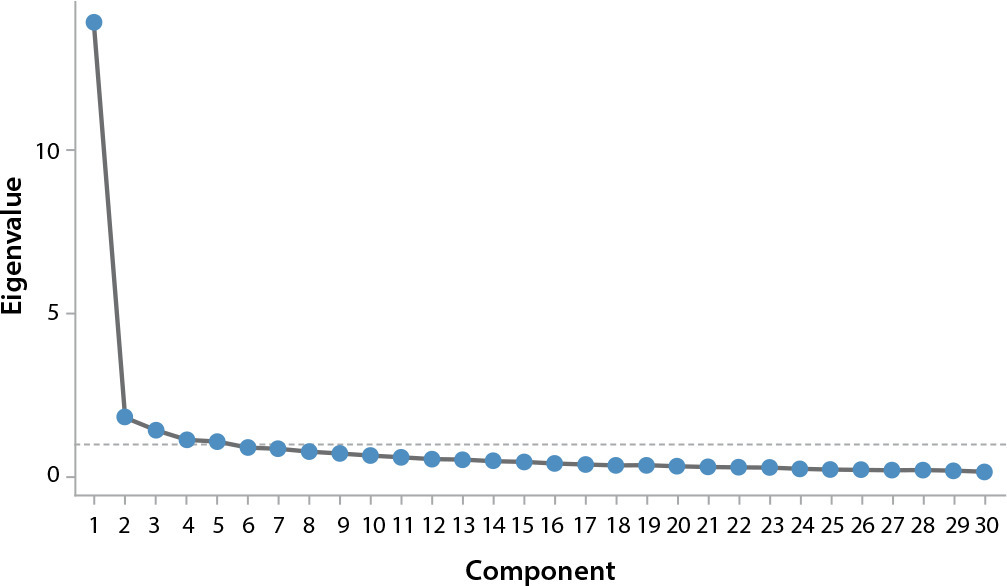
-
ORIGINAL ARTICLE07-29-2024
Family refusal of skin donation for transplantation: trends and associated factors
Revista Brasileira de Enfermagem. 2024;77(3):e20230209
Abstract
ORIGINAL ARTICLEFamily refusal of skin donation for transplantation: trends and associated factors
Revista Brasileira de Enfermagem. 2024;77(3):e20230209
DOI 10.1590/0034-7167-2023-0209
Views0See moreABSTRACT
Objectives:
to analyze the trends and factors associated with family refusal of skin donation for transplantation.
Methods:
this cross-sectional study was conducted in the State of São Paulo, with family authorization terms collected from 2001 to 2020. The variables analyzed included year, age, gender, cause of death, and type of institution. Data were analyzed using linear and multiple logistic regression, with the Odds Ratio estimated at p<0.05 for statistical significance.
Results:
1,355 individuals refused skin donation. The trend of refusals decreased between 2001 and 2009 in the age groups of 0-11 years and 12-19 years, but increased in the group aged ≥60 years. This trend continued to decrease in the 0-11 years group from 2010 to 2020, and increased in the 20-40 years group. Males and the age groups of 20-40 years, 41-59 years, and ≥60 years exhibited 27%, 34%, 47%, and 53% lower chances of refusal, respectively.
Conclusions:
there is an urgent need for measures to mitigate the high number of refusals associated with skin donation.
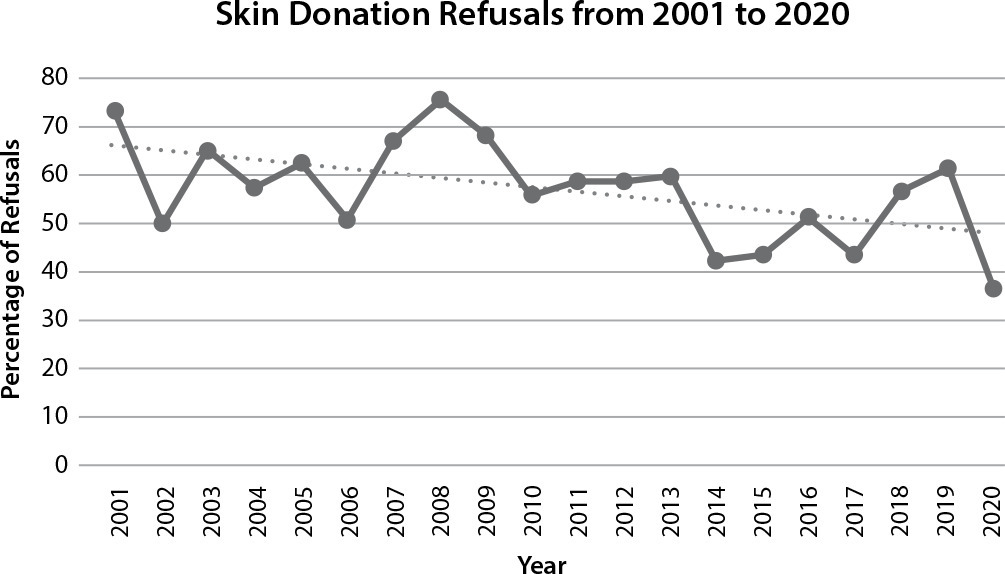
-
ORIGINAL ARTICLE06-14-2024
Mid-range theory of the nursing diagnosis Overweight
Revista Brasileira de Enfermagem. 2024;77(2):e20230372
Abstract
ORIGINAL ARTICLEMid-range theory of the nursing diagnosis Overweight
Revista Brasileira de Enfermagem. 2024;77(2):e20230372
DOI 10.1590/0034-7167-2023-0372
Views0See moreABSTRACT
Objective:
To build a mid-range theory for the nursing diagnosis Overweight in adolescents and young adults.
Methods:
A methodological study in the light of the theoretical frameworks of Roy and of Lopes, Silva and Herdman. A total of 3,925 articles were retrieved and assessed using the State of the Art Through Systematic Review software. The final sample consisted of 28 articles.
Results:
The findings converged to 3 essential attributes, 13 antecedents, and 7 consequences. A mid-range theory was built consisting of an illustrated diagram, 11 propositions, and 12 causal relationships.
Final considerations:
From the creation of the theory, it was possible to better understand the nursing diagnosis Overweight within the context of adolescents and young adults. Understanding nursing phenomena contributes to nursing science’s advancement and strengthening.
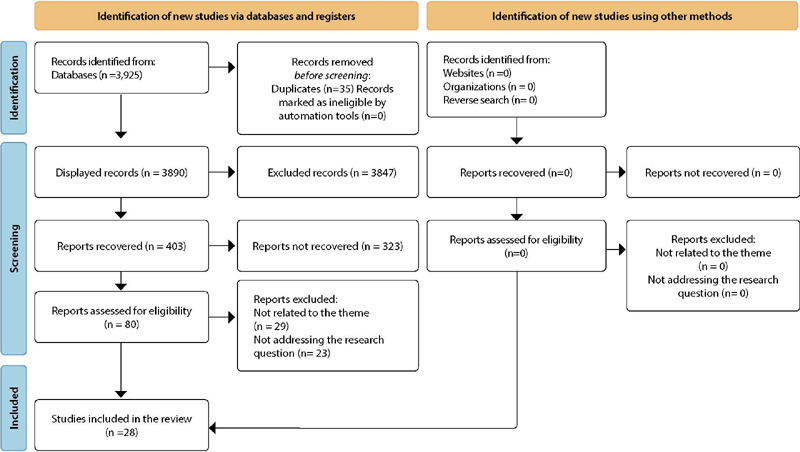
-
ORIGINAL ARTICLE06-14-2024
Cardiovascular Risk and Lifestyle: comparison between teaching workers in Portugal and Brazil
Revista Brasileira de Enfermagem. 2024;77(2):e20230354
Abstract
ORIGINAL ARTICLECardiovascular Risk and Lifestyle: comparison between teaching workers in Portugal and Brazil
Revista Brasileira de Enfermagem. 2024;77(2):e20230354
DOI 10.1590/0034-7167-2023-0354
Views0ABSTRACT
Objective:
Compare Cardiovascular Risk between workers in Brazil and Portugal who work in the teaching context and its relationship with Lifestyle and Common Mental Disorder.
Methods:
Cross-sectional study that compared the cardiovascular health conditions of teaching workers in Manaus (Brazil) and Coimbra (Portugal). The odds ratio between groups was estimated.
Results:
The differences were: Smoking and hypercholesterolemia in participants from Portugal. Hypertension, chronic disease, increased abdominal perimeter, common mental disorder, and absence from work in Brazil. The variables with the greatest effect for high cardiovascular risk were: Country-Portugal [17.273 (95%CI1.538-193.951)], sex-male [61.577 (95%CI5.398-702.469)] and smoking [593.398 (95%CI57.330-6.142.020)].
Conclusion:
The differences in risk between groups showed that participants from Portugal, men, with high blood pressure and/or smokers are the most vulnerable to having a cardiovascular event. There is a need for interventions to promote cardiovascular health in the workplace in both countries.
Keywords:Community-Based Participatory ResearchHeart Disease Risk FactorsLife StyleOccupational HealthUniversitiesSee more -
ORIGINAL ARTICLE06-14-2024
Functional performance assessment scale for children and adolescents with cancer: cross-cultural study
Revista Brasileira de Enfermagem. 2024;77(2):e20230331
Abstract
ORIGINAL ARTICLEFunctional performance assessment scale for children and adolescents with cancer: cross-cultural study
Revista Brasileira de Enfermagem. 2024;77(2):e20230331
DOI 10.1590/0034-7167-2023-0331
Views0ABSTRACT
Objectives:
to describe the methodological process of cross-cultural adaptation of the PlayPerformance Scale for Children to Brazilian Portuguese.
Methods:
methodological study of translation and cross-cultural adaptation in six stages: translation, synthesis of translations, back-translation, evaluation by a committee of judges, evaluation by expert nurses, and pretest. The agreement and representativeness of the items were assessed using the content validity index. A minimum value of 80% agreement was considered.
Results:
all stages of the translation and cross-cultural adaptation process were satisfactory. In the evaluation performed by the committee of judges, all items obtained agreement above 80%. Fifteen pediatric nurses conducted the content validation, suggesting necessary modifications for understanding and application. Thirty children and adolescents with cancer were assessed with the scale for the pre-test.
Conclusions:
the scale was cross-culturally adapted to Brazilian Portuguese. The need for psychometric testing in a consistent sample is emphasized.
Keywords:Cross-Cultural ComparisonNursing Methodology ResearchOncologyPediatric NursingPhysical Functional PerformanceSee more -
ORIGINAL ARTICLE06-14-2024
Meanings attributed to health-related quality of life by caregivers of adolescents with diabetes
Revista Brasileira de Enfermagem. 2024;77(2):e20230314
Abstract
ORIGINAL ARTICLEMeanings attributed to health-related quality of life by caregivers of adolescents with diabetes
Revista Brasileira de Enfermagem. 2024;77(2):e20230314
DOI 10.1590/0034-7167-2023-0314
Views0See moreABSTRACT
Objective:
to interpret the meanings attributed to the health-related quality of life by caregivers of adolescents with type 1 diabetes mellitus.
Methods:
qualitative, descriptive-exploratory study of 14 caregivers of adolescents with diabetes developed at the reference outpatient clinic for endocrine diseases in a city in the state of Paraíba. Interviews were performed between May and September 2021. Inductive thematic analysis of the empirical material, and its interpretation in light of the concepts of health-related quality of life and family functioning were performed.
Results:
the meanings attributed by caregivers to the health-related quality of life of adolescents converged on the feeling of being healthy, healthy eating, satisfactory family income, family involvement in care and effective access to the care network.
Final Considerations:
knowledge of these meanings enables health professionals to develop strategies that meet the unique demands of caregivers experiencing this diagnosis.
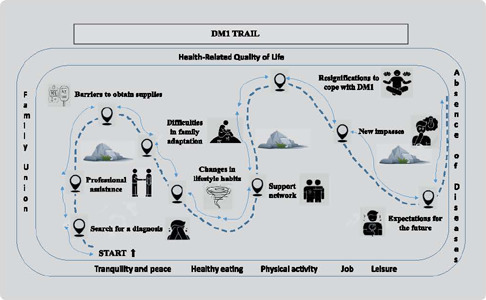
-
REVIEW06-14-2024
Critical analysis of the scientific production on Jean Watson’s Theory of Human Care
Revista Brasileira de Enfermagem. 2024;77(2):e20230231
Abstract
REVIEWCritical analysis of the scientific production on Jean Watson’s Theory of Human Care
Revista Brasileira de Enfermagem. 2024;77(2):e20230231
DOI 10.1590/0034-7167-2023-0231
Views0See moreABSTRACT
Objectives:
to analyze current scientific production on the use of the theoretical-methodological precepts of Jean Watson’s Theory of Human Care/Clinical Caritas Process.
Methods:
quantitative, exploratory, descriptive study using data from 1979 to 2023 in the Scopus database. Analysis was carried out using VOSviewer software.
Results:
the 73 studies included establish a network of collaboration among 221 authors from 155 institutions in 18 countries, who discuss the development of ethical behavior in nursing staff, through technical improvement, implementation, and validation of instrumental strategies capable of measuring and evaluating the quality of holistic and empathetic care. The Theory of Human Caring contributes to nursing training and care, and Process Clinical Caritas-Veritas is useful for the different possibilities of practice and education.
Conclusions:
it is important to strengthen with more empirical data a nursing work model centered on individual human care, supporting the evolution of scientific nursing knowledge.
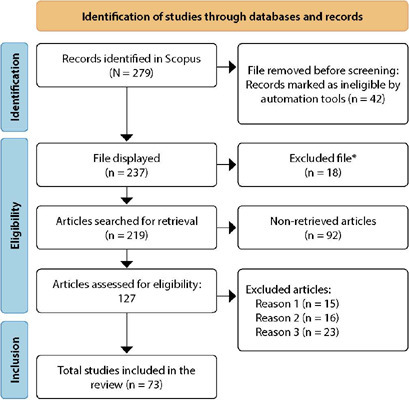
-
REVIEW06-14-2024
Primary health care professionals’ practice in the face of leprosy: a scoping review
Revista Brasileira de Enfermagem. 2024;77(2):e20230207
Abstract
REVIEWPrimary health care professionals’ practice in the face of leprosy: a scoping review
Revista Brasileira de Enfermagem. 2024;77(2):e20230207
DOI 10.1590/0034-7167-2023-0207
Views0See moreABSTRACT
Objectives:
to identify Primary Health Care professionals’ practice in the face of leprosy.
Methods:
a scoping review, carried out between November 2022 and January 2023, conducted according to the methodological structure proposed by JBI and checklist Preferred Reporting Items for Systematic Reviews and Meta-Analyses extension for Scoping Reviews in six databases and additional literature.
Results:
the sample consisted of 11 articles, published between 2008 and 2022. The findings were synthesized into three categories: Early diagnosis and timely treatment; Physical disability prevention; and Household and social contact surveillance.
Final Considerations:
there is a need to align the practices carried out with those recommended by the Brazilian National Program for Leprosy Control and Elimination, as some were not identified in studies, which implies losses to qualified assistance directed to patient demands, with a view to control and elimination of leprosy.
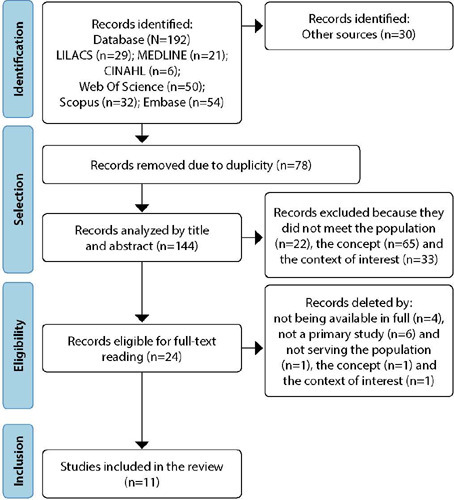
-
ORIGINAL ARTICLE06-14-2024
Validity of the TBApp mobile application for self-care management for people with tuberculosis
Revista Brasileira de Enfermagem. 2024;77(2):e20230195
Abstract
ORIGINAL ARTICLEValidity of the TBApp mobile application for self-care management for people with tuberculosis
Revista Brasileira de Enfermagem. 2024;77(2):e20230195
DOI 10.1590/0034-7167-2023-0195
Views1See moreABSTRACT
Objectives:
to describe the validity process of the TBApp mobile application for self-care management for people with tuberculosis linked to Primary Health Care.
Methods:
methodological research developed with ten expert judges, carried out virtually. The application was assessed in relation to content and technology quality in seven domains (objectivity; structure and appearance; relevance; functionality; reliability; usability; and efficiency), using an instrument with a Likert scale.
Results:
TBApp was considered valid, relevant, functional, reliable and effective by expert judges. The objectives, structure and presentation and relevance domains presented an overall Content Validity Index of 0.93, and the functionality, reliability, usability and efficiency domains presented characteristics and sub-characteristics values greater than 0.80.
Conclusions:
TBApp is a creative and innovative tool that can be used by people with TB and disseminated in the scientific community.
Search
Search in:
Nuvem de Tags
Aged (144) Atenção Primária à Saúde (239) COVID-19 (104) Cuidados de Enfermagem (269) Educação em Enfermagem (151) Educação em Saúde (139) Enfermagem (930) Estudos de Validação (131) Health Education (144) Idoso (208) Mental Health (149) Nursing (987) Nursing Care (306) Patient Safety (151) Primary Health Care (284) Qualidade de Vida (104) Quality of Life (106) Saúde Mental (145) Segurança do Paciente (150) Validation Studies (108)



